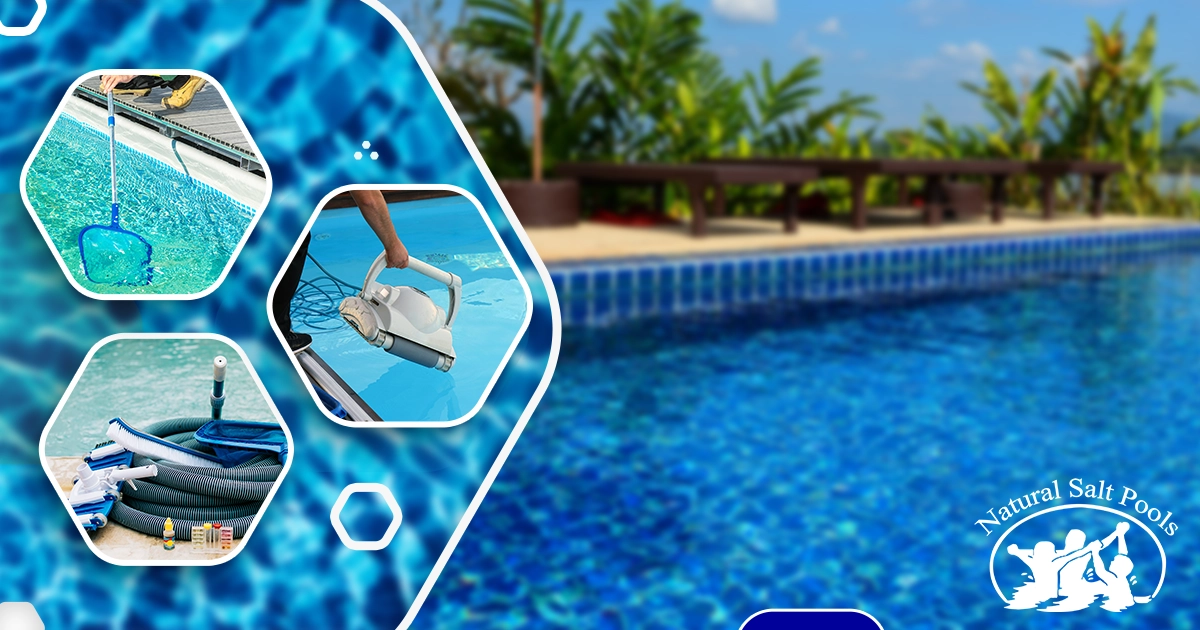Saltwater pools offer a luxurious and refreshing swimming experience but require proper pool maintenance service to keep them clean and inviting. Unlike traditional chlorine pools, saltwater pools utilize a salt chlorinator to produce chlorine, resulting in softer, gentler water. A pool maintenance course is crucial to ensure the system functions effectively and prevents issues like algae growth and equipment damage for its longevity. In this comprehensive guide, we’ll delve into the essential steps for mastering saltwater pool maintenance tasks yourself or enlisting the help of professional pool maintenance. Investing time and effort into caring for your saltwater pool maintenance will ensure years of enjoyment and relaxation.
- Understanding saltwater pool chemistry: Saltwater pool chemistry differs from traditional chlorine pools. While saltwater pools still contain chlorine, it’s generated from salt through electrolysis. It should maintain proper salt levels, typically around 3,000 to 4,000 parts per million (ppm), to ensure efficient chlorine production. Properly monitor pH levels regularly, aiming for a range of 7.2 to 7.6, to prevent corrosion and optimize chlorine effectiveness. Test water regularly by using a reliable test kit to maintain balanced chemistry.
- Salt chlorinator maintenance: Inspect the salt chlorinator cell regularly for scaling and debris buildup. Clean as needed to ensure optimal chlorine production. Check for any leaks or damage to the chlorinator unit, and address issues promptly to prevent further damage. Follow the manufacturer’s guidelines for cleaning and maintenance to prolong the lifespan of the chlorinator.
- Routine cleaning: Skim the pool surface daily to remove leaves, debris, and insects. Brush the pool walls and floor weekly to prevent algae growth and the buildup of debris. Vacuum the pool regularly to remove dirt and sediment from the bottom. Clean the pool filter according to the manufacturer’s instructions to maintain proper filtration.
- Algae prevention: Maintain proper water chemistry and circulation to prevent algae growth. Shock the pool after heavy use or during periods of high temperatures to kill algae spores and bacteria. Use algaecide as a preventive measure, especially during warmer months or when algae growth is more prevalent.
- Winterization (if applicable): If you live in a climate where temperatures drop below freezing, winterize your saltwater pool to protect it from damage. Lower the water level, drain equipment, and add winterizing chemicals as recommended. Cover the pool with a suitable winter cover to keep out debris and prevent algae growth.
- Professional maintenance: Consider hiring a professional pool service for regular maintenance and inspections, especially if you’re unfamiliar with saltwater pool care or have a busy schedule. Professional technicians can perform tasks such as balancing water chemistry, inspecting equipment, and addressing any issues before they escalate.
Expert Saltwater Pool Maintenance Services in Hawaii.
If you’re looking for expert saltwater pool maintenance services in Hawaii, it’s a good idea to research pool maintenance near me. While evaluating pool maintenance services, consider factors such as their experience, reputation, customer reviews, services offered, pricing, and any specializations they may have in saltwater pool maintenance. Natural Salt Pool LLC is here to help you keep your pool in optimal condition. We ensure that your professional saltwater pool maintenance services in Hawaii keep your pool clean, safe, and enjoyable throughout the swimming season. Here are some steps you can take to find the right professionals:
- Research local companies: Start by researching local pool maintenance companies that specialize in saltwater pools. Look for companies with positive reviews, experience, and expertise in handling saltwater systems.
- Check credentials: Ensure that the companies you’re considering are properly licensed, insured, and certified to perform pool maintenance services in Hawaii. This helps ensure that they meet industry standards and regulations.
- Ask for recommendations: Reach out to friends, family, neighbors, or colleagues who own saltwater pools in Hawaii. They may be able to recommend reliable maintenance services based on their own experiences.
- Request quotes and services offered: Contact multiple companies to request quotes and inquire about the specific services they offer for saltwater pool maintenance. Make sure they provide comprehensive services that meet your pool’s needs, including cleaning, water testing, chemical balancing, equipment maintenance, and repairs.
- Verify customer satisfaction: Look for testimonials, reviews, or references from previous clients to gauge the level of customer satisfaction with the company’s services. A track record of satisfied customers is a good indicator of the reliability of a company’s service.
- Clarify communication and availability: Ensure that the company maintains clear communication channels and is readily available to address any concerns or emergencies regarding your saltwater pool.
- Evaluate professionalism: Assess the professionalism of the company’s representatives during your interactions with them. Professionalism in communication, appearance, and conduct often reflects the quality of service you can expect.
 Leave us a review on Google !
Leave us a review on Google !






